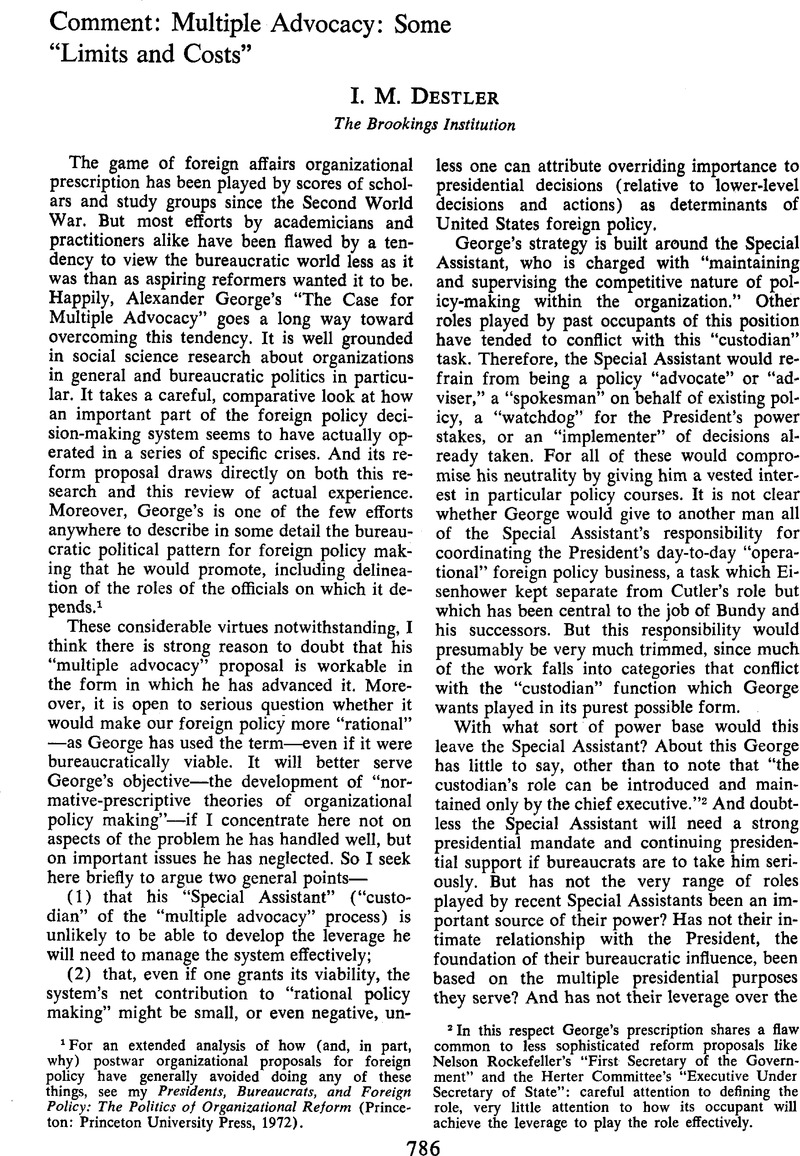Published online by Cambridge University Press: 01 August 2014

1 For an extended analysis of how (and, in part, why) postwar organizational proposals for foreign policy have generally avoided doing any of these things, see my Presidents, Bureaucrats, and Foreign Policy: The Politics of Organizational Reform (Princeton: Princeton University Press, 1972)Google Scholar.
2 In this respect George's prescription shares a flaw common to less sophisticated reform proposals like Nelson Rockefeller's “First Secretary of the Government” and the Herter Committee's “Executive Under Secretary of State”: careful attention to defining the role, very little attention to how its occupant will achieve the leverage to play the role effectively.
3 Nor can one be reassured by George's reference to Cutler as a Special Assistant with a particularly well-defined and delimited role. His influence seems to have been far less than that which George's “custodian” would require. But it should not be inferred from this discussion that there are easy ways of measuring the various sources of “leverage” available to an official like the Special Assistant, or of predicting whether such a role would be bureaucratically viable. Analysts of such matters—this one included—have not gotten much beyond the stage of making lists of “bargaining advantages,” such as the “resources” for advocacy enumerated by George. But this is hardly a case for ignoring the problem—as most organizational reform proposals do.
4 Graham T. Allison and Morton H. Halperin argue elsewhere:
The action channel for major foreign policy decisions can be usefully divided into that portion which leads to decisions by senior players and that part which follows from those decisions. The latter is frequently referred to as ‘implementation’ but we resist that terminology as too restrictive. Many elements of implementation stem from sources other than decisions by senior players.
(“Bureaucratic Politics: A Paradigm and Some Policy Implications,” World Politics, Vol. 24 [Spring Supplement, 1972], p. 46.Google Scholar) Thus, for purposes of analysis, they divide the bureaucratic politics of foreign policy-making into “policy and decision games” and “action games.”
5 Nihart, Brooke, “National Security Council: New Staff System After One Year,” Armed Forces Journal, 04 4, 1970, p. 29Google Scholar.
6 “The outsider believes that a presidential order is consistently followed out. Nonsense. I have to spend considerable time seeing that it is carried out and in the spirit the President intended.” Quoted by Pett, Saul, “Henry A. Kissinger: Loyal Retainer or Nixon's Svengali?” Washington Post, 08 23, 1970, p. 83Google Scholar.
7 “America's Administrative Response to Its World Problems,” Daedalus (Spring 1958)Google Scholar; reprinted in Jackson Subcommittee, Organizing for National Security, Volume II, 1961, p. 233Google Scholar.
8 Allison, , Essence of Decision: Explaining the Cuban Missile Crisis (Little, Brown, 1971), p. 146Google Scholar.
9 Presumably, to be both able to and motivated to decide an issue in such a “presidential” way, an official would need to be in close communication with the President, and to derive much of his own leverage in the bureaucracy from Presidential confidence.
10 I have also argued that they could better combine responsiveness to the President with influence over day-to-day operations if this team were headed by the Secretary of State and composed mainly of high State Department policy officials. Presidents, Bureaucrats, and Foreign Policy, Chs. 5, 9.
11 Sorensen expresses this dilemma well: “In choosing between conflicting advice, the President is also choosing between conflicting advisers, conferring recognition on some while rebuffing others. He will, consequently, take care to pay more attention to the advice of the man who must carry out the decision than the advice of a mere ‘kibitzer.’ He will be slow to overrule a Cabinet officer whose pride or prestige have been committed, not only to ease that officer's personal feelings but to maintain his utility and credibility” (Decision-Making in the White House [New York: Columbia University Press, 1963], p. 79Google Scholar).
Comments
No Comments have been published for this article.